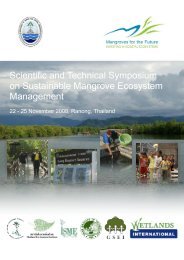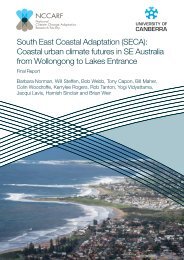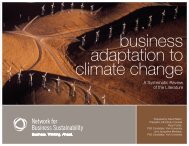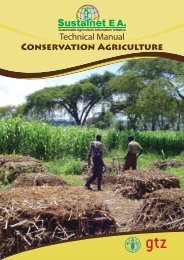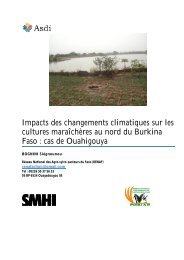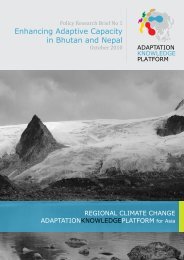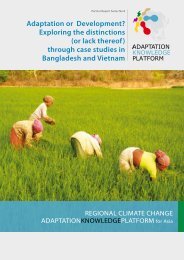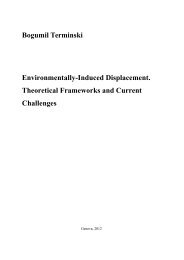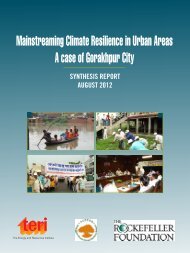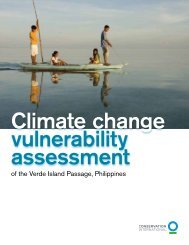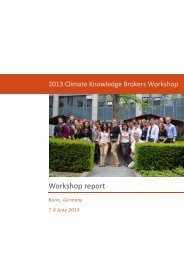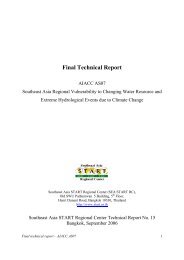<strong>climate</strong> (which we live <strong>and</strong> work in 24/7) is what we adapt to on a daily <strong>and</strong>weekly basis. We don't think oh... in 10 odd years it will be warmer or cooler sowe better plant this now! This is a controversial question assuming that <strong>climate</strong><strong>change</strong> is proven factor <strong>and</strong> difficult to answer. We adapt <strong>and</strong> deal with it daily.[Market Gardener, Melbourne]In comparison, subsistence <strong>and</strong> hobby growers have expressed their concern towards<strong>climate</strong> <strong>change</strong>, pointing out that there seem to be a lack of underst<strong>and</strong>ing <strong>and</strong> evensome narrow mindedness about the topic.Well you know I come to this from a strong sustainability perspective but noteveryone does. I’d probably say few people probably do, who are gettinginvolved in community gardens <strong>and</strong> so, you know, people linking a communitygarden with <strong>climate</strong> <strong>change</strong> as a mitigation strategy is probably few but I think ittakes people like myself [<strong>and</strong> others] talking about it within the group <strong>and</strong> we’ll doworkshops <strong>and</strong> that sort of thing <strong>and</strong> that’ll hopefully broaden people’sperspective of their ability to affect <strong>climate</strong> <strong>change</strong> [Community Gardener <strong>and</strong>Permaculturalist, Gold Coast].Lack of data, information <strong>and</strong> local modelling were also suggested as a deterrent tounderst<strong>and</strong>ing <strong>and</strong> adapting to <strong>climate</strong> <strong>change</strong>:I am really concerned about it [<strong>climate</strong> <strong>change</strong>]. I mean deeply concerned. Andyeah I think we have got to stop just sticking our head in the s<strong>and</strong> <strong>and</strong> start reallyhaving a good look around <strong>and</strong> preparing <strong>and</strong> looking at data <strong>and</strong> research so wecan factor that into our preparations <strong>and</strong> here I don’t know I would really like to beable to get hold of some sort of forecasting information about what they think the[Gold] Coast is going look like. Will it get wetter? Will it get dryer? Obviously thereare weather fluctuations [from] <strong>climate</strong> <strong>change</strong> or not, so this idea that things thatare dry, [are] they are going to be dryer? If they are wet are they going to bewetter? If cyclones are going to be bigger, more of them <strong>and</strong> sooner, longer, thatkind of thing you kind of want to factor that in. [Non-Government Organisation,Gold Coast]Despite this apparent scepticism or lack of knowledge about <strong>climate</strong> <strong>change</strong> <strong>and</strong> itsimpacts on <strong>food</strong> <strong>security</strong>, numerous concerns were raised. Concerns about increaseddrought, higher temperatures, water shortages, extreme events such as hail storms,sudden temperature fluctuations, shorter summers, <strong>and</strong> milder winters were raised bymany interviewees.An experienced backyard gardener <strong>and</strong> life-long Melbourne resident, commented thatthe ‘real warm springs <strong>and</strong> damp summers’ are a ‘drastic <strong>change</strong>’ which had impactedboth backyard gardeners like himself <strong>and</strong> commercial producers in <strong>and</strong> aroundMelbourne:The weather <strong>change</strong>s are a real concern, we’ve seen a progressive decline in theweather, <strong>and</strong> I’ve had to <strong>change</strong> my strategies about how I grow [my plants], howI prune [my trees] so they get more air circulation, putting them in warmer spotsso they dry more quickly … Now what we’re getting is much shorter summers<strong>and</strong> sudden fluctuations in spring [Backyard Gardener <strong>and</strong> Permaculturalist,Melbourne].<strong>Urban</strong> <strong>food</strong> <strong>security</strong>, <strong>urban</strong> <strong>resilience</strong> <strong>and</strong> <strong>climate</strong> <strong>change</strong> 37
This gardener also commented on the milder winters, which seem to many to beanother trend for Melbourne:It didn’t get cold enough for a lot of plants to die down, so that asparagus, whichshould die down in winter, <strong>and</strong> produce new spears in the spring, it didn’t do that,it was far too mild. We had some fruit trees flower for a second time, which theydon’t normally do, because it stayed warm into late autumn … [The mild wintersare] a real worry, [especially for commercial growers]. A lot of fruit requires acertain chill temperature, so they can produce in the spring. Because our wintersare getting milder, we might not get enough chill period for the apples to produceproperly [Backyard Gardener <strong>and</strong> Permaculturalist, Melbourne].The disturbed water cycle was also a talking point on the Gold Coast, especially afterthe 2010–2011 floods. A well-established organic farming couple, with over 15 years’experience farming on Mount Tamborine, in the Gold Cost hinterl<strong>and</strong>, explained howthe <strong>change</strong>s in rainfall patterns <strong>and</strong> volumes has affected them in the past few years:Talking about weather, you were talking about <strong>climate</strong> <strong>change</strong> <strong>and</strong> that, we’vehad two of the worst years in 16 years you know, last year it was the floodswhere whilst it didn’t flood on the mountain it was three months of persistent rain<strong>and</strong> no sun <strong>and</strong> we got to a stage where by March, for the first time, we didn’thave anything to pick, you know it was so waterlogged, <strong>and</strong> because there hadn’tbeen any sun, nothing was growing – if you put a seed in, it wouldn’t grow[Farmers, Gold Coast].Another interviewee in Melbourne commented that water restrictions made backyard<strong>and</strong> community gardening difficult, especially for those who did not have rainwatercapture <strong>and</strong> storage tanks:In the drought, when we were on 3 <strong>and</strong> 3A water restrictions, there was noaccommodating people who wanted to grow their own <strong>food</strong> … You had to applyfor exemptions. Some schools got exemptions, to keep watering their schoolgardens. But that wasn’t available to households [Academic Researcher,Melbourne].Water <strong>security</strong> emerged from this research as a major consideration when thinking ofthe nexus between <strong>urban</strong> agriculture, <strong>urban</strong> <strong>food</strong> <strong>security</strong>, <strong>climate</strong> <strong>change</strong> <strong>and</strong> <strong>urban</strong><strong>resilience</strong>. However, as pointed out by one of the participants, there is a certain irony tothe prevailing system of water allocations <strong>and</strong> restrictions, <strong>and</strong> how this is perceived bythe wider community:Supposedly we’ve got a water shortage, <strong>and</strong> we’ve got people growing citrusorchards that are very unsustainable water-wise, <strong>and</strong> we’re doing it in semi-arid,half-desert environments. We’re growing sugar cane, which uses massivequantities of water, in really dry areas. These growers are getting subsidisedwater: cotton is terrible, sugar-cane is worse [in terms of water usage]. We’re alsogrowing semi-aquatic rice, in the driest parts of Australia … There has been a lotof complaints by gardening groups, <strong>and</strong> calls for the government to give people in<strong>urban</strong> environments incentives to grow their own <strong>food</strong>, by giving them water atthe same rate that the farmers get it. We’re being charged a fortune for waterhere, but the irony is that 80 percent of all water usage is in [commercial]<strong>Urban</strong> <strong>food</strong> <strong>security</strong>, <strong>urban</strong> <strong>resilience</strong> <strong>and</strong> <strong>climate</strong> <strong>change</strong> 38
- Page 1 and 2: Synthesis and Integrative ResearchF
- Page 3 and 4: Published by the National Climate C
- Page 5 and 6: ABSTRACTFood security is increasing
- Page 7 and 8: 1. a review of the literature: on n
- Page 9 and 10: its Food for All project. This help
- Page 13 and 14: In response to the existential thre
- Page 15 and 16: 2. OBJECTIVES OF THE RESEARCHFood i
- Page 17 and 18: debates and to the more systematic
- Page 19 and 20: organisation in the past few years.
- Page 21 and 22: 4. RESULTSIn this section we presen
- Page 23 and 24: increasing productivity. Thus, whil
- Page 25 and 26: people and the origins of their foo
- Page 27 and 28: urban food supply chains. Thus, whi
- Page 29 and 30: This logistics system is dominated
- Page 31 and 32: Like Hodgson et al., as per definit
- Page 33 and 34: esilient, powerful by being locally
- Page 35 and 36: volume or even its contribution to
- Page 37: community food growing can have on
- Page 40 and 41: generations this history has been f
- Page 42 and 43: a stronger focus on addressing the
- Page 44 and 45: The third key aspect is fairness -
- Page 48 and 49: agriculture. Eight percent is in ur
- Page 50 and 51: This concept of the ‘spaces in be
- Page 52 and 53: esearch scientist and chair of the
- Page 54 and 55: As discussed above, protection of t
- Page 56: 4.2.5 What is the extent and the im
- Page 60 and 61: no place under the panoply of pract
- Page 62 and 63: increased, the market dominance of
- Page 64 and 65: … the residents of S Park called
- Page 66 and 67: 5. CONCLUSIONSThere is growing conc
- Page 68 and 69: urban resilience. This inevitably c
- Page 70 and 71: In many respects these contrasting
- Page 72 and 73: Many interviewees of both standpoin
- Page 74 and 75: a given area. The rationale for thi
- Page 76 and 77: mapping the location of sources of
- Page 78 and 79: Australian food policy debates refl
- Page 80 and 81: APPENDIX 1: URBAN FOOD SECURITY, UR
- Page 82 and 83: IntroductionGlobally, and in Austra
- Page 84 and 85: Review methodsThis stage of the res
- Page 86 and 87: despite many of the causes of food
- Page 88 and 89: …by 2050… food production will
- Page 90 and 91: 2. How is food security (in general
- Page 92 and 93: the food security of cities, but no
- Page 94 and 95: While some see the density of devel
- Page 96 and 97:
when suppliers, distributors, and c
- Page 98 and 99:
a more prominent role in enhancing
- Page 100 and 101:
community gardens webpage on the Co
- Page 102 and 103:
comprehensive description of the ca
- Page 104 and 105:
In both the developed and developin
- Page 106 and 107:
Their review notes a significant in
- Page 108 and 109:
lines of supply from often rural pl
- Page 110 and 111:
1 IntroductionCities have always be
- Page 112 and 113:
Despite some attempts to curb urban
- Page 114 and 115:
the Gold Coast remains a city that
- Page 116 and 117:
ackyard/community gardenernot affil
- Page 118 and 119:
level in local government. VicHealt
- Page 120:
Figure 2: Impacts on Municipal Food
- Page 125 and 126:
security I recognise that the cost
- Page 127 and 128:
United States, he offered the follo
- Page 129 and 130:
This vision highlights the multi-fu
- Page 131 and 132:
An environmental education centre.
- Page 133 and 134:
Melbourne Food ForestA Melbourne ga
- Page 135 and 136:
stakeholder consultations, the repo
- Page 137 and 138:
can. We sense the changes. The earl
- Page 139 and 140:
half-desert environments. We’re g
- Page 141 and 142:
etain its basic function and struct
- Page 143 and 144:
government; and that trying to get
- Page 145 and 146:
the north and the west, where it wo
- Page 147 and 148:
Why do people buy so much food that
- Page 149 and 150:
urban agriculture (however broadly
- Page 151 and 152:
enefits and risks. Before we can co
- Page 153 and 154:
Another important and tangible role
- Page 155 and 156:
coast without any problems whatsoev
- Page 157 and 158:
BIBLIOGRAPHYAECOM (2011) Scoping St
- Page 159 and 160:
Burns, C. I., A. (2007). Measuring
- Page 161 and 162:
Edwards, F., & Mercer, D. (2010). M
- Page 163 and 164:
James, S. O’Neill, P. and Dimeski
- Page 165 and 166:
Millar, R., 2012, ‘Government shi
- Page 167 and 168:
Saltmarsh, N. M., J; Longhurst, N.
- Page 169 and 170:
Walker B., 2008, Resilience Thinkin



